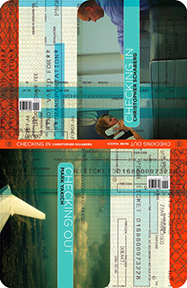I am a space-race child. I was an Elroy. From a very young age I was aware of the sky. The television and radio were filled with spacecraft and astronauts seeking unknown planets. I was told I was a part of the generation that would take to the stars. I believed it. Like many children, I fell in love with the moon. I watched clouds come, play and leave. There are interminable stars. I pretended I could see the rockets or the astronauts' orbits or that I could be that high.
Look up and you see contrails. I was that child with his head in the clouds. I read about the sky. Everything. At nine I knew all of the names of the clouds and omens. I read about the stars. I learned about physics and galaxies and gravity. I made star maps for projects and could draw in missing clouded stars in the major constellations with an extended finger. I learned the sun was the reason that life and evolution had peaked with me. I learned that thunderstorms always came from far away and if the physics aligned, could be lethal.
I learned I could never stop reading. I learned that no matter how far we looked away into space we could never see the end. And I dreamed that dream about being the one, that one, that bright dot hurtling into the full moon. Horses, lions and ogres gamboled in the clouds for others...but I saw maps. Clouds made the morphing land masses and contrails were the highways. I grew up at a geological peculiarity. The peculiarity is visible from space. Anyone looking down would naturally find this a convenient marker.
Young boys notice the silliest of things. They notice that a girl has a shoelace that is about to break but they don't take in her new blue hair ribbon. Young boys notice that the mosquitoes always bite more before the rain and that frogs croak louder after. Young boys notice the history teacher reading the lesson from the text as if for the first time. And one young boy notices the brightest dots slashing across the sky, followed by perfectly straight lines of white smoke. Airplanes and jet smoke. Clouds played at cartography and the moon claimed by a few, as if any other occupied country. The earth turns and the others with it.
I looked at the sky, the myriad of blue, the rising moon and revolving stars. I believed I breathed the universe. Up in the blue every day. Airplanes and jet smoke. The jets would be directly overhead and make an instantaneous decision. Turn left, right, or plunge directly ahead into the unknown. The contrails would crisscross and dissipate and drift off in a high wind, sometimes in the same direction as the jet. The jets flew to where I stood, head flopped back on my neck, mouth agape and turned north or south or east or the other way with the white trails pointing in the direction somewhere very far away from where I stood.
The white smoke never led to me, to that point on the earth far below. Where was the jet off to? Who was on it And most importantly: why? Why were they up there going to somewhere? Why was I only watching down tere where the earth only moved at mere celestial speeds? Up there the passengers were called jetsetters. It was a new word. It was a new way to see the future.
Decades later, having waded in oceans and tried to learn languages, I became a part of that future. I became a jetsetter and flew and looked down so very far at everything that can be imagined in one glance, and hoped there was one young child who looked up at the contrails with wonder.
I still see the contrails leading elsewhere and long to grasp one white wisp before the wind pulls it. And it still seems like no one wants the moon except me.
After decades of jet-setting, Peter Bracking is wheels down in the tropical east. The only occupation he regrets leaving is beach bum. He is the artistic director of Utter Stories.






